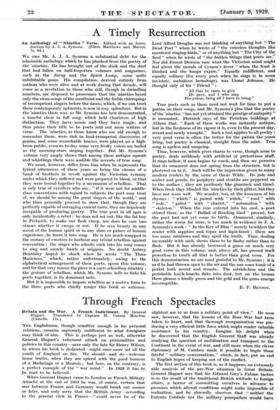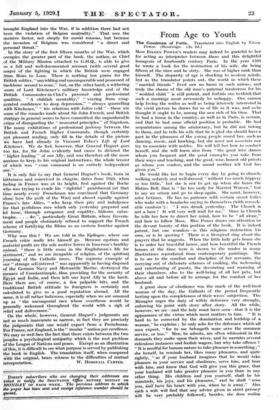Through French Spectacles
ritain and the War. -A French Indictment. By General limgyet. Translated by Captain H. Cotton Idinchin. (Cassell& 15s.)
Vila Englishman, though sensitive enough in his personal ;relations, remains supremely indifferent to what foreikners may think of him. This is perhaps just as well, otherwise General Huguet's vehement attack on _personalities and policies in this country—.save only the late Sir Henry Wilson, to whom his book is dedicated—might once more set all the youth of England on. fire. We -should—and do—welcome home truths, when they are spiced with the good humour of a Madariaga or a Maurois ; but here, on the contrary, is a perfect example of the " war mind." In 1928 it has to ,be read to be believed.
When General Huguet came to London as French Military Attaché at the end of 1904 he was, of course, certain that war between France and Germany would break out sooner or later, and only sorry that the British_ Army—according to the general view in France—" could never be of the
slightest use, to us from a military point of view." He soon saw, however, that the lessons of the Boer War had been taken to heart, and that thorough reorganization was pro- ducing a very efficient little force which might render valuable assistance to his country. - Imagine his delight when he discovered that the English General Staff was already studying the question of mobilization and transport to the Continent in the event of war, and still more when the. clever diplomacy of M. Cambon made it possible to begin those fateful " military conversations," which, in fact, put an end
to English hopes of keeping out of the conflict. _
The first section of this book is, as it happens, an extremely able analysis of the pre-War situation in Great Britain. General Huguet sees that. Sir Edward Grey's Fabian tactics were the result of the traditional British attitude to foreign affairs, a horror of committing ourselves in advance - to promises which` altered conditions might make impossible- of realization,, and he shrewdly observes that " neither 'the Entente Cordiale nor the military • pOurPar- eis would have
brought England into the War, if in addition there had not been the violation of Belgian neutrality." That was the decisive factor, not simply for moral reasons, but because the invasion of Belgium was considered " a direct and personal _threat." . "
Ip the story of the first fifteen months of the War, which occupies the .:greater part of the book, the author, as Chief of the Military Mission attached to G.H.Q., is able to give us a full and well-doeumented account (with _ several good *TS) _of the fighting in which the British were engaged from Mons to Loos. There is nothing but praise for the British soldier, " unyielding and unconquerable and pbsse4ed of backbone second to none," but, on the other hand, a withering scorn of Lord Kitchener's military knowledge and of the British Commander-in-Chief's personal and professional
qualities. " A childish mentality," " veering from exag- gerated confidence to deep depression," " always quarrelling with Kitchener," " his relations with Joffre cold "—these are
some of the remarks made about Sir John French, and British .strategYin general seems to have" committed the unpardonable crime of disregarding the," immortal principles " of Napoleon. The many exhibitions of professional jealousy, between the British and French Higher ComMands, though certainly not pleasant reading, only fill in the details of the picture we have had already in Viseourit Esher'S Life of Lord
Kitchener. We do feel, hoWever," that General Huguet gbes too far, for , Sir John evidently had cause to distrust the `..` higher leading" of our Ally, and was therefore"all the more anxious to keeP to his original. inatructioris; the Whole tenour of which " was "your 'cOmmand " is an` entirely independent . , one." . - . .
It is only "fair to say that General Huguet's book, horn hitternesa and conceived in chagrin, dates froin" 1922; "When feeling in Fiance" was at its height; first against the Boehe who was trying to evade his "rightful " punishment (at that time, nearly, every Frenchman was convinced that Germany bore the guilt of the War) and alniost equally against France's late Allies, " who keep their pity and indidgence for that -perfidious race which only 'yesterday prepared "and let loose, throligh arrogance and cupidity, hideCOS " Catas- trophe. . . . Particularly Great Britain, whose GoVern- merit and people obstinately refused to support the- French scheme of fortifying the Rhine as an eastern "frontier against
Germany. , • . - - , Why was this ? We are told in the Epilogue, where our French critic really lets . himself go. Because egotism and
material profit are the sole motive forces in Einerson's healthy animal, "there is little room in the Englishman's life for sentiment," and we are incapable of religion, of the spiritual yearning of the Catholic. "races.' "The -snpreme example ' of our" strange self-intereSt " was apparently in having disposed of the German NaVy and Mercantile 'Marine, destroyed the menace of Constantinople, thus providing for the security of Egypt and India, and then left-our loyal Ally 'in the lurch. Here theie ire, of Course, a few palpable " hits," and the traditional British attitude to foreignerS is certainly not calculated to give us a good reputation :abroad. All the same, it is all rather ludicrous, especially when we are summed up 'as " the uncongenial race whose . overthrow would be generally welcomed throughout 'the world with a sigh of relief and deliverance." " Onthe Whole; hoiveVer, General Huguet'S judgments are not So much inabeiirate as nitro*, in 'fact they are precisely the judgments that'one would expect" front a" Frenchman. For France, not England,-is the " insular " nation par excellence. We may is well face the fact that there exists between the two Peoples a psychological antipathy 'which is the root problem of the League of Nations and "Peace. ' Ekdept as an illustration Of this, it is difficult to "see what purpose is served by publishing the bOOk in English. The translation itself; when compared with the original, bearS witness to "the- difficulties of mutual







































 Previous page
Previous page